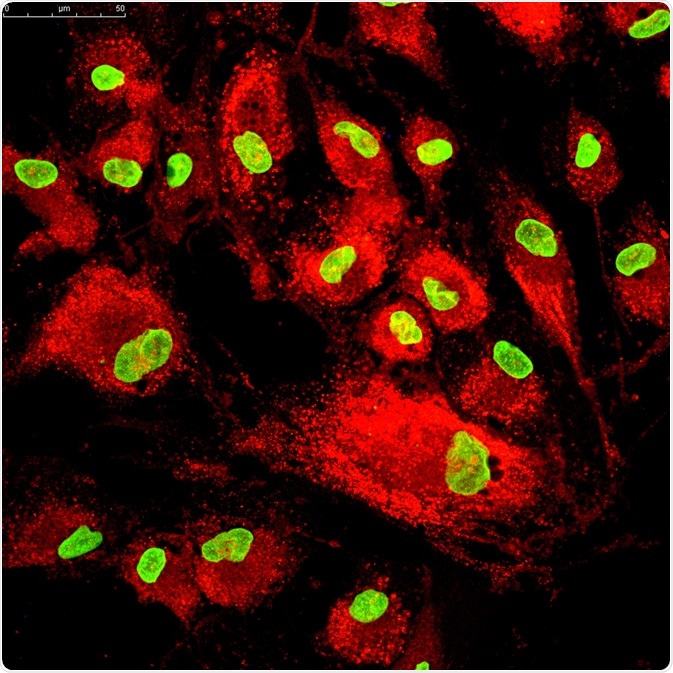The role of mesenchymal stem cells
Mesenchymal stem cells (MSCs) are multipotent progenitor stromal cells. They can differentiate into cells of the mesodermal lineage, such as adipocytes (fat), osteocytes (bone) and chondrocytes (cartilage).

Image Credit: Vshivkova/Shutterstock.com
While these are the main types of cells derived from MSCs, they can also create cells of other embryonic lineages.
Their functions involve making and repairing cells of the mesodermal lineage, as well as modulating innate and adaptive immunity. Recently, MSCs have also been implicated in the creation of the microenvironment needed for blood stem cells in the bone marrow.
In 1999, human MSCs derived from bone marrow were first described, and since then, they have been successfully isolated from almost all tissues.
Their isolation has allowed for their extensive study, with much research focusing on how they might be used to treat diseases, especially diseases of the bone and cartilage, although this has recently become extended to include a wide range of diseases, from cancer to neurodegenerative diseases.
However, while they have been implicated in a number of diseases, the development of applications and therapeutics based on this research is still in its infancy. Below, we discuss what we currently know in terms of MSCs and the treatment options.
Using mesenchymal stem cells in the treatment of disease
Given their role in the repair of bone and cartilage, MSCs have been studied to help develop new treatments for knee meniscus injuries as well as osteoarthritis caused by long-term accumulated damage.
Results have shown that MSCs have the capability of reducing inflammation, which is not only useful in treating these sorts of injuries but also helpful in preventing transplant rejection and slowing the progression of autoimmune diseases.
These findings, therefore, initiated studies into further potential therapeutic uses of MSCs, including investigation of their use in cardiovascular diseases due to their ability to form new blood vessels.
MSCs and Neurodegenerative diseases
As MSCs can differentiate into neurons, they offer therapeutic potential for neurodegenerative diseases. Studies have shown that the transplantation of MSCs into the spinal cords of patients with amyotrophic lateral sclerosis (ALS) can reduce the characteristic structural changes of cells in the spinal cord, as well as reducing the symptoms of the disease.
Parkinson's disease is a neurodegenerative disorder, which is characterized by a remarkable loss of dopaminergic neurons. New strategies to treat Parkinson's disease are based on the ability of MSCs to induce dopamine cell differentiation.
Finally, recent studies have demonstrated the effectiveness of MSC transplants in slowing down the progression of Alzheimer’s disease, a disease with no cure and for which treatment options are very limited.
MSCs and Autoimmune diseases
Recent studies have shown that MSCs can regulate immune responses, therefore, they have been used to prevent inflammatory damage and provide treatment options for autoimmune diseases, including rheumatoid arthritis and type 1 diabetes.
MSCs and cardiovascular diseases
Recent studies have demonstrated that MSCs can be used to treat myocardial infarction and heart failure.
MSCs can differentiate into cardiomyocytes (cardiac muscle cells), although this rarely happens in vivo.
However, the systematic injection of bone marrow-derived MSCs in rodents has proven to be an effective method of repairing damaged cardiac tissue, opening the door to developing a new treatment in human cardiovascular diseases.
The challenges to mesenchymal stem cell research
While the use of MSCs in creating new therapies for many diseases is promising, several challenges still remain.
These challenges include the fact that the process of stem cell research can be slow and difficult due to its complexity.
Also, much is still unknown about how MSCs can be safely delivered into tissues in the human body.
Research has shown that transplanted MSCs are often rapidly removed from the human body, which limits their effectiveness. To further the use of MSC cells in developing disease treatments, these limitations will first have to be overcome.
Sources:
- Uccelli, A., Moretta, L. & Pistoia, V. Mesenchymal stem cells in health and disease. Nat Rev Immunol 8, 726–736 (2008). https://doi.org/10.1038/nri2395
- Ullah I, Subbarao RB, Rho GJ. Human mesenchymal stem cells - current trends and future prospective. Biosci Rep. 2015;35(2):e00191. Published 2015 Apr 28. DOI:10.1042/BSR20150025
Further Reading
Last Updated: Mar 18, 2020